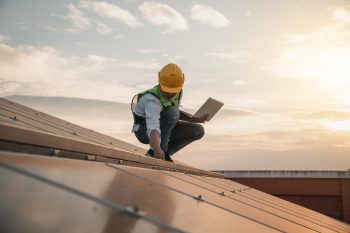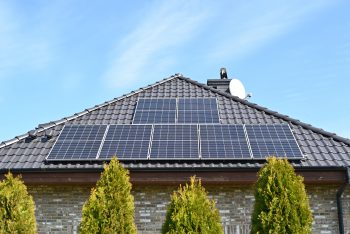Federal Legislation Will Streamline Solar Permitting, Grow Clean Energy Economy
The American Energy Opportunity Act will create jobs, make U.S. energy more resilient, and reduce carbon emissions

WASHINGTON, D.C. – The Solar Energy Industries Association (SEIA) and industry leaders commend U.S. Senators Martin Heinrich (D-NM) and Susan Collins (R-ME) for introducing the American Energy Opportunity Act, which will provide voluntary assistance and tools to local governments to simplify, standardize, and automate clean energy permitting for their residents and businesses while enhancing safety.
The legislation builds on the Solar Automated Permit Processing (SolarAPP) initiative launched by SEIA and The Solar Foundation last year. The goal for both SolarAPP and the American Energy Opportunity Act is to simplify the process for permitting and inspecting distributed solar and battery installations through a free, universally-available online permitting portal for local governments.
“If we truly want economical clean energy at a local level, we need to streamline the permitting process for distributed energy technologies like rooftop solar,” said Senator Heinrich, Ranking Member on the Senate Subcommittee on Energy. “The current patchwork of permitting requirements across local jurisdictions causes delays and increases costs for both local governments and the businesses and homeowners who want to build smaller-scale renewable energy systems. I am proud to introduce bipartisan legislation to help state and local governments reduce unnecessary costs and procedures in order to promote small-scale grid modernizations in communities in New Mexico and across the nation.”
“Solar energy is a proven and powerful tool in the fight against climate change,” said Senator Collins. “The American Energy Opportunity Act would help spur the adoption of this technology by providing beneficial tools to streamline the permitting process at the municipal level, which will help drive down the hidden costs of installing rooftop solar. This bill, coupled with the BEST Act we introduced earlier this year to promote next-generation energy storage, holds the potential to unleash the promise of clean, renewable energy throughout the country.”
Today, interconnection, permitting, and inspection processes adds up to about $7,000, or $1.00 per watt, in direct and indirect costs to a typical residential solar energy system. This increases installation costs for consumers and stifles homeowner and business investments in clean energy.
“This bill is a win-win-win for consumers, local governments, and clean energy businesses. Local governments and building inspectors don’t always have the resources they need to go from permitting a kitchen remodel to permitting a solar system,” said Abigail Ross Hopper, president and CEO of the Solar Energy Industries Association. “This bill will provide tools to improve the solar permitting process across the nation, reducing costs for consumers while enhancing safety and quality. This means more people and businesses can deploy solar faster and better.”
In addition to reducing the cost of solar installations, the American Energy Opportunity Act will support local governments by creating a framework to work collaboratively toward instantaneous permitting for distributed energy resources. Instantaneous permitting will simplify going solar and reduce costs while helping communities reduce their administrative burdens, attract business investment, and promote economic development and job creation.
Solar industry executives on what this legislation will mean for the clean energy economy:
“Solar and battery permitting should be simple,” said Lynn Jurich, CEO of Sunrun. “This forward-looking, common-sense legislation will encourage more people to adopt solar, create quality local jobs, and bring more reliable local clean energy to our energy system. We need more clean and resilient options in our communities, and this is a way to make real progress.”
“Technology innovation and smart software solutions are driving mainstream adoption of solar and storage,” said Tom Werner, SunPower Chair and CEO. “It’s time for the permitting process to catch up. The American Energy Opportunity Act can improve this experience for future solar consumers, reducing costs and our nation’s reliance on traditional fossil fuels and accelerating our transition to a low-carbon energy future.”
“In order to bring clean energy solutions into every home, we need to make the process simpler and more affordable for consumers,” said Thomas Plagemann, Chief Commercial Officer and EVP of Capital Markets at Vivint Solar. “This bill does both by cutting unnecessary red-tape and delays related to permitting, helping to reduce the burden on local government resources without compromising on consumer safety. This collaborative approach represents a common-sense solution because ultimately local governments and solar providers are both striving to provide a good experience for the same customers.”
###
About SEIA®:
Celebrating its 45th anniversary in 2019, the Solar Energy Industries Association® is the national trade association of the U.S. solar energy industry, which now employs more than 242,000 Americans. Through advocacy and education, SEIA® is building a strong solar industry to power America. SEIA works with its 1,000 member companies to build jobs and diversity, champion the use of cost-competitive solar in America, remove market barriers and educate the public on the benefits of solar energy. Visit SEIA online at www.seia.org.
Media Contact:
Morgan Lyons, SEIA’s Senior Communications Manager, mlyons@seia.org (202) 556-2872



